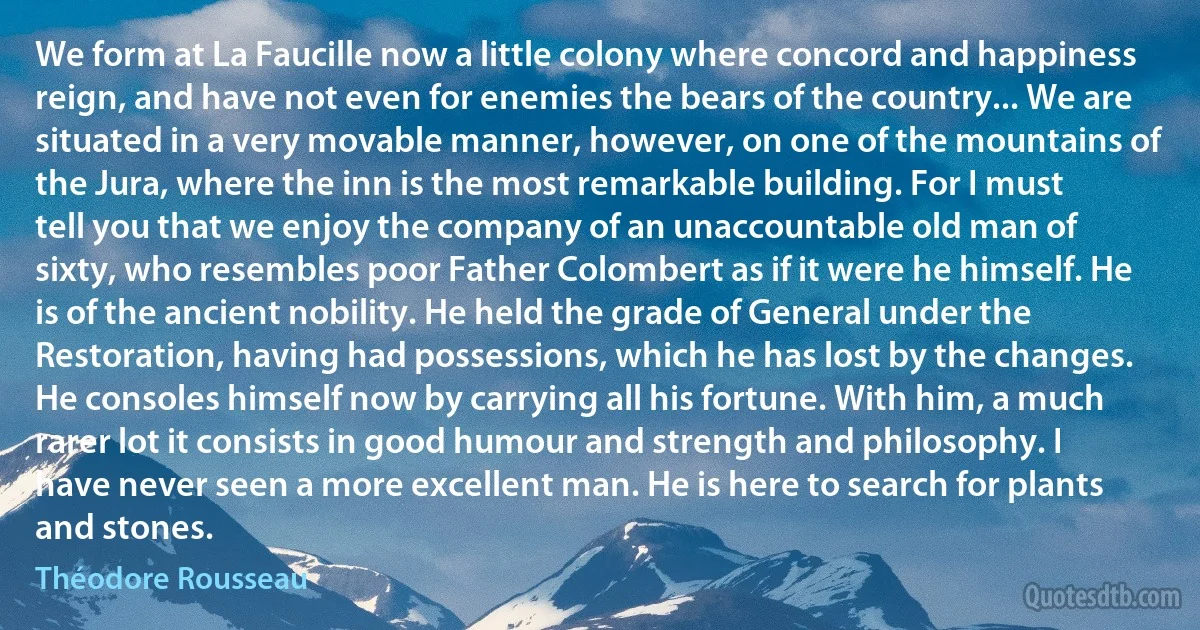Reign Quotes - page 10
Under queen Elizabeth, the minstrels had lost the protection of the opulent; and their credit was sunk so low in the public estimation, that, by a statute in the thirty-ninth year of her reign against vagrants, they were included among the rogues, vagabonds, and sturdy beggars, and subjected to the like punishments. This edict also affected all fencers, bearwards, common players of interludes (with the exception of such players as belonged to great personages, and were authorised to play under the hand and seal of their patrons), as well as minstrels wandering abroad, jugglers, tinkers, and pedlars; and seems to have given the death's wound to the profession of the minstrels, who had so long enjoyed the public favour, and basked in the sunshine of prosperity.

Joseph Strutt
I may just add, that in addition to the hand-guns, I meet with other instruments of like kind mentioned in the reign of Elizabeth, namely, demy hags, or hag butts. They shot with these engines not only at butts and other dead marks, but also at birds and beasts, using sometimes bullets and sometimes half shots; but in the beginning of the seventeenth century the word artillery was used in a much more extensive sense, and comprehended long-bows, cross-bows, slur-bows, and stone-bows; also scorpions, rams, and catapults, which, the writer tells us, were formerly used; he then names the fire-arms as follows, cannons, basilisks, culverins, jakers, faulcons, minions, fowlers, chambers, harguebusses, calivers, petronils, pistols, and dags. "This," says he, "is the artillerie which is nowe in the most estimation, and they are divided into great ordinance, and into shot or guns," which proves that the use of fire-arms had then in great measure superseded the practice of archery.

Joseph Strutt
The first class contains four, which, we are informed, may be properly called beasts for hunting; namely, the hare, the hart, the wolf, and the wild boar. The second class contains the names of the beasts of the chase, and they are five; that is to say, the buck, the doe, the fox, the martin, and the roe. In the third class we find three, that are said to afford "greate dysporte" in the pursuit, and they are denominated, the grey or badger, the wild-cat and the otter...The reader may possibly be surprised, when he casts his eye over the foregoing list of animals for hunting, at seeing the names of several that do not exist at this time in England, and especially of the wolf, because he will readily recollect the story so commonly told of their destruction during the reign of Edgar.

Joseph Strutt
Sultãn Fîrûz Shãh composed a book also in which he compiled an account of his reign and which he named Futuhãt-i-Fîrûz Shãhî..."He writes in its second chapter... ‘Muslim and infidel women used to visit sepulchres and temples, which led to many evils. I stopped it. I got mosques built in place of temples'...

Firuz Shah Tughlaq
In his reign Hajib Toghantugeen, an officer of his government, proceeded in command of an army towards Hindoostan, and being appointed governor of Lahore, crossed the Ganges, and carried his conquests farther than any Mussulman had hitherto done, except the Emperor Mahmood. Like him he plundered many rich cities and temples of their wealth, and returned in triumph to Lahore, which now became in some measure the capital of the empire, for the Suljooks having deprived the house of Ghizny of most of its territory both in Eeran and Tooran, the royal family went to reside in India.

Firishta
Even during the fifteen years of Alptigin's reign Subuktigin is represented by Firishta in an untranslated passage to have made frequent attacks upon India, and even to have penetrated as far as Sodra on the Chinab, where he demolished idols in celebration of Mahmud's birth, which, as it occurred on the date of the prophet's birth, Subuktigin was anxious that it should be illustrated by an event similar to the destruction of idols in the palace of the Persian king by an earthquake, on the day of the prophet's birth.

Firishta
Training of bulls, bears, horses, and other animals, for the purpose of baiting them with dogs, was certainly practiced by the jugglers; and this vicious pastime has the sanction of high antiquity. Fitz-Stephen, who lived in the reign of Henry II, tells us that, in the forenoon of every holiday, during the winter season, the young Londoners were amused with boars opposed to each other in battle, or with bulls and full-grown bears baited by dogs. This author makes no mention of horses; and I believe the baiting of these noble and useful animals was never a general practice: it was, however, no doubt, partially performed...Asses also were treated with the same inhumanity; but probably the poor beasts did not afford sufficient sport in the tormenting, and therefore were seldom brought forward as the objects of this barbarous diversion.

Joseph Strutt
O Love, divine Love, why do You lay siege to me?
In a frenzy of love for me, You find no rest.
From five sides You move against me:
Hearing, sight, taste, touch, and scent.
To come out is to be caught; I cannot hide from You.
If I come out through sight I see Love
Painted in every form and color,
Inviting me to come to You, to dwell in You.
If I leave through the door of hearing,
What I hear points only to You, Lord;
I cannot escape Love through this gage.
If I come out through taste, every flavor proclaims:
"Love, divine Love, hungering Love!
You have caught me on Your hook, for you want to reign in me."
If I leave through the door of scent
I sense You in all creation; You have caught me
And wounded me through that fragrance.
If I come out through the sense of touch
I find Your lineaments in every creature;
To try to flee from You is madness.

Jacopone da Todi
When Raja Sidhraj Jaisingh Solanki became the king, he extended his conquest as far as Malwa and Burhanpur etc. and laid foundation of lofty forts such as the forts of Broach and Dabhoi etc. He dug the tank of Sahastraling in Pattan, many others in Biramgam and at most places in Sorath. His reign is known as 'Sang Bast', the Age of Stone Buildings. He founded the city of Sidhpur and built the famous Rudramal Temple. It is related that when he intended to build Rudramal, he summoned astrologers to elect an auspicious hour for it. The astrologers said to him that some harm through heavenly revolution is presaged from Alauddin when his turn comes to the Saltanat of Dihli. The Raja relied on the statement of astrologers and entered into a pledge and pact with the said Sultan. The Sultan had said. 'If I do not destroy it under terms of the pact, yet I will leave some religious vestiges.

Alauddin Khalji
With Allah's permission, I have been on the throne for 57 years. Even though various events I witness throughout my reign, I never felt this worry with the relations between race and religion that is becoming frail. ... If the people love peace like me, whereupon use these opportunity and collective rights with gentility.

Abdul Halim of Kedah
Under Shahjahan, Akbar's Sulehkul was almost reversed. During his reign temples were destroyed in Gujarat, Banaras and Allahabad, and at Orchha. Like Jahangir he stopped marriages between Muslim girls and Hindu men. Apostasy from Islam again became a capital crime in accordance with the tenets of the Shariat. During the reign of Shahjahan titles in use among Khalifas and Ghaznavids were revived.

Shah Jahan
It had been brought to the notice of His Majesty that during the late reign many idol temples had been begun, but remained unfinished at Benares, the great stronghold of infidelity. The infidels were now desirous of completing them. His Majesty, the defender of the faith, gave orders that at Benares, and throughout all his dominions in every place, all temples that had been begun should be cast down. It was now reported from the province of Allahabad that seventy-six temples had been destroyed in the district of Benares.

Shah Jahan
Some other practices discontinued by Akbar were revived by Shahjahan. Forcible conversion during war became common in his reign. "When Shuja was appointed governor of Kabul (he carried on) a ruthless war in the Hindu territory beyond the Indus... Sixteen sons and dependants of Hathi were converted by force. The sword of Islam further yielded a crop of Muslim converts... The rebellion of Jujhar Singh yielded a rich crop of Muslim converts, mostly minors. His young son Durga and his grandson Durjan Sal were both converted to become Imam Quli and Ali Quli... Most of the women had burnt themselves... but such as were captured - probably slave girls and maids - were converted and distributed among Muslim Mansabdars... The conquest of Beglana was followed by conversion of Naharji's son... who now became Daulatmand.”.

Shah Jahan
A little patience, and we shall see the reign of witches pass over, their spells dissolve, and the people, recovering their true sight, restore their government to its true principles. It is true that in the meantime we are suffering deeply in spirit, and incurring the horrors of a war and long oppressions of enormous public debt...If the game runs sometime against us at home, we must have patience till luck turns, and then we shall have an opportunity of winning back the principles we have lost, for this is a game where principles are at stake.

Thomas Jefferson



